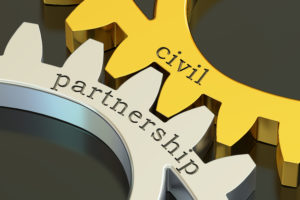An Update on the Possibility of a Civil Partnership for Opposite-Sex Couples
After their appeal was rejected by the Court of Appeal in February 2017, Rebecca Steinfeld and Charles Keidan have been granted the right to pursue their case, seeking the legal right of opposite-sex couples to enter into civil partnerships, in the Supreme Court.
The couple, who are in a committed, long-term relationship, seek legal recognition of their relationship by way of civil partnership. However, they are presently precluded from doing so by virtue of the Civil Partnership Act 2004, which only allows for same-sex couples.
Their appeal was previously rejected on the basis that the government should have more time to consider the impact of the extension of marriage to same-sex couples on civil partnerships, prior to making a final decision on whether to dispense with civil partnerships or extend to opposite-sex couples.

Current position
The law, as it currently stands, allows same-sex couples to legally formalise their relationships by way of either civil partnerships or civil marriages (pursuant to the Marriage (Same Sex Couples) Act 2013). Opposite-sex couples, however, are limited to only civil marriage, in order to gain the legal benefits and protections that come with a legally recognised relationship.
The couple argue that, ‘whilst most couples want financial and legal protection for themselves and their families, not all feel comfortable with marriage’. They are opposed to civil marriage and claim that the bar on civil partnerships for opposite-sex couples is discriminatory and a violation of their Human Rights.
Why choose a civil partnership over a marriage?
Some couples may feel that marriage is an outdated system, which is traditionally rooted in patriarchy and religion. This may not be reflective of the way they conduct their relationship, particularly in these modern times where traditional roles, for some, are a thing of the past.
It is arguably not unreasonable for those seeking legal recognition of their relationships and entitlement to the benefits afforded, but who are opposed to the concept of marriage, to wish to enter into another formal arrangement, which is better reflective of their values and beliefs.
Rebecca Steinfeld and Charles Kedian have reportedly said they wish to formalise their relationship within a social institution “which is modern, which is symmetrical and that focuses on equality, which is exactly what a civil partnership is”.
How do Civil Partnerships and Marriage compare?
- Marriages are solemnized by saying a prescribed form of words, whereas Civil partnerships are registered by signing the civil partnership document, with no words required to be spoken.
- Marriages can be conducted through either a civil ceremony, or a religious ceremony if the religious organisation has agreed to solemnize marriages of same sex couples according to its rites. The formation of a civil partnership is an entirely civil event. Civil partners can choose to add a ceremony to follow the formation of their civil partnership but this does not form part of the legal formation.
- Marriage certificates include the names of only the fathers of the parties. Civil partnership certificates include the names of both parents of the parties.
- In terms of annulment, a marriage can be annulled, if at the time of the marriage the respondent was suffering from a venereal disease in a communicable form. This is not a ground for annulling a civil partnership.
- The facts that one must rely on for divorce and dissolution of a civil partnership are identical, save that a civil partner is unable to rely on adultery.
- Equal legal treatment in matters including inheritance, tax, pensions and next-of-kin
So what next?
The couple ‘hope the Supreme Court will deliver a judgment that will finally provide access to civil partnerships for thousands of families across the country’.
We eagerly await the outcome.
If you have any questions regarding the legal consequences of marriage or civil partnerships, including divorce and dissolution, please contact our expert Family & Divorce team on 020 7631 4141.




